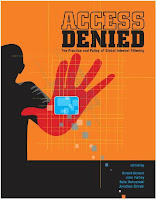 A Tale of Two Internets
A Tale of Two InternetsTens of thousands of international travelers descended upon the Tunis airport for the World Summit on the Information Society in 2005.
The summit brought together policy-makers, journalists, nongovernmental organization (NGO) leaders, academics, and others to consider the present and future of information and communications technologies.
Polite Tunisian handlers in crisp, colorful uniforms guided arriving summit attendees to buses that took those with credentials to one of several sites nearby.
The capital, Tunis, hosted the main conference facilities. The seaside town of Yasmine-Hammamet, with boardwalks, theme parks, casinos, and breathtaking sunsets, housed delegates who could not find lodging in the city.
Within the main conference facilities in Tunis, they would experience the Internet as though they were in a Silicon Valley start-up: unfettered access to whatever they sought to view or write online. But those by the sea in Yasmine-Hammamet, outside the United Nations–sponsored conference facilities, encountered a radically different Internet—the one that is commonplace for Tunisians.
If attendees sought to view a site critical of the summit’s proceedings or mentioning human rights—for instance, a site called Citizen’s Summit, they would see a page indicating that a network error had occurred.
Among other curious things, the page was written in French, not the native Arabic. The blockpage is partially accurate: something in the network had caused that information never to reach the surfer’s laptop.
1 But it was not an error.
The blockage is intentional, one of thousands put in place daily by the government of Tunisia. The ad hoc filtering of information underway in Tunisia is flatly at odds with the ideals touted by World Summit participants.
Tunisia’s filtering system was implemented long before the World Summit kicked off, and it was unaffected by the attention the summit brought to Tunisia.
A filtering system is meant to stop ordinary citizens from accessing some parts of the Internet deemed by the state to be too sensitive, for one reason or another. The information blocked ranges from politics to sexuality to culture to religion.
As user-generated content has gained in popularity and new tools have made it easier to create and distribute it, filtering regimes have pivoted to stop citizens from publishing undesirable thoughts, images, and sounds, whether for a local or an international audience.
The system that facilitates a state’s Internet filtering can also be configured to enable the state to track citizens’ Web surfing or to listen in on their conversations, whether lawful or unlawful.
Download
The summit brought together policy-makers, journalists, nongovernmental organization (NGO) leaders, academics, and others to consider the present and future of information and communications technologies.
Polite Tunisian handlers in crisp, colorful uniforms guided arriving summit attendees to buses that took those with credentials to one of several sites nearby.
The capital, Tunis, hosted the main conference facilities. The seaside town of Yasmine-Hammamet, with boardwalks, theme parks, casinos, and breathtaking sunsets, housed delegates who could not find lodging in the city.
Within the main conference facilities in Tunis, they would experience the Internet as though they were in a Silicon Valley start-up: unfettered access to whatever they sought to view or write online. But those by the sea in Yasmine-Hammamet, outside the United Nations–sponsored conference facilities, encountered a radically different Internet—the one that is commonplace for Tunisians.
If attendees sought to view a site critical of the summit’s proceedings or mentioning human rights—for instance, a site called Citizen’s Summit, they would see a page indicating that a network error had occurred.
Among other curious things, the page was written in French, not the native Arabic. The blockpage is partially accurate: something in the network had caused that information never to reach the surfer’s laptop.
1 But it was not an error.
The blockage is intentional, one of thousands put in place daily by the government of Tunisia. The ad hoc filtering of information underway in Tunisia is flatly at odds with the ideals touted by World Summit participants.
Tunisia’s filtering system was implemented long before the World Summit kicked off, and it was unaffected by the attention the summit brought to Tunisia.
A filtering system is meant to stop ordinary citizens from accessing some parts of the Internet deemed by the state to be too sensitive, for one reason or another. The information blocked ranges from politics to sexuality to culture to religion.
As user-generated content has gained in popularity and new tools have made it easier to create and distribute it, filtering regimes have pivoted to stop citizens from publishing undesirable thoughts, images, and sounds, whether for a local or an international audience.
The system that facilitates a state’s Internet filtering can also be configured to enable the state to track citizens’ Web surfing or to listen in on their conversations, whether lawful or unlawful.
Download
Labels: Book
0 comments:
Post a Comment